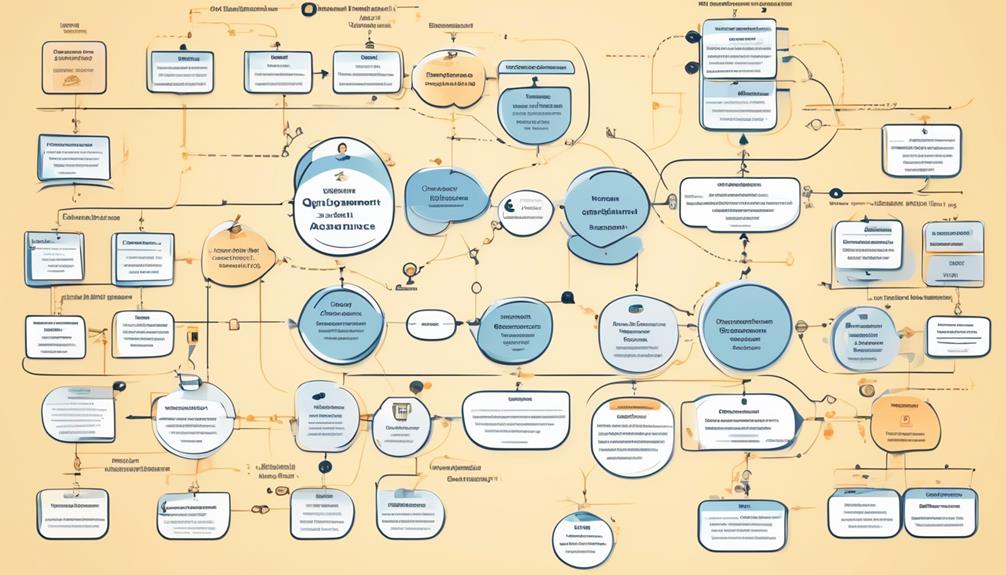In the past year, have you been aware of the 60% increase in demand for QA testers in the rapidly expanding technology industry?
As businesses strive to deliver seamless and high-quality software products, the need for skilled QA testers has never been more critical.
But what exactly is driving this demand, and what does it mean for the future of QA testing careers?
Key Takeaways
- Demand for QA testers has surged by 60% in the past year alone.
- Increasing reliance on software products is driving the demand for QA testers.
- Technical proficiency, attention to detail, and proficiency in programming languages and automation tools are essential skills for QA testing careers.
- The demand for qualified QA engineers is high, creating abundant career opportunities with a projected 25% growth over the next decade.
Top picks for "tester demand"
Open Amazon search results for this keyword.
As an affiliate, we earn on qualifying purchases.
Current Demand for QA Testers
In our industry, we're witnessing a significant surge in the demand for QA testers, driven by the increasing reliance on software products and the necessity for dependable software and IT systems. Companies are recognizing the critical role of QA testing in ensuring the quality and reliability of their software products.
This heightened demand for QA testers is fueled by the need to meet the growing expectations of users for seamless and efficient software experiences. As companies strive to deliver exceptional user experiences (UX), the importance of QA testing in achieving this goal can't be overstated.
The demand for QA testers is further amplified by the increasing need for automation in software development and testing processes. With the rapid advancements in technology, companies are seeking QA testers who are proficient in automation testing to enhance efficiency and accuracy in the quality assurance process.
As a result, the demand for skilled and experienced QA testers is outpacing the current supply, leading to lucrative career opportunities in the field of software QA testing. This trend is expected to persist as companies prioritize the delivery of high-quality, reliable software products to maintain their competitive edge in the market.
Essential Skills for QA Testing Careers

As QA testers, we need to be technically proficient to understand the complexities of software development and effectively identify potential issues.
Attention to detail is crucial for thorough and accurate testing, ensuring that we don't miss any bugs or issues that could impact the product.
Technical Proficiency
Mastering technical proficiency is crucial for individuals pursuing careers in QA testing. It requires a deep understanding of programming languages, testing frameworks, and automation tools. QA testers must be adept in using debugging tools, version control systems, and CI/CD pipelines to effectively test software.
Proficiency in operating systems, databases, and networking concepts ensures comprehensive testing across different environments. Understanding software development methodologies like Agile, Scrum, and DevOps is critical for effective collaboration with development teams.
Additionally, proficiency in testing techniques such as black-box testing, white-box testing, regression testing, and performance testing is vital for ensuring thorough and effective testing of software applications.
As QA testers, technical proficiency is essential for navigating the complexities of automation testing, manual testing, and web development. It ultimately contributes to the delivery of high-quality software.
Attention to Detail
Developing a keen attention to detail is a fundamental skill for QA testers, enabling us to meticulously identify and report even the smallest flaws or issues in software. In the table below, we highlight the importance of attention to detail in QA testing careers:
| Importance of Attention to Detail in QA Testing Careers |
|---|
| Ensuring software quality and reliability |
| Thorough examination of functionality and user interface |
| Creating comprehensive test plans |
| Accurately documenting and communicating defects |
| Identifying subtle deviations from expected behavior |
Attention to detail is crucial for maintaining the integrity and quality of software releases. As QA testers, we understand the demand for QA engineers with strong attention to detail who can identify potential problems and contribute to the improvement of software through meticulous QA training.
Career Opportunities in Quality Assurance
In the rapidly evolving tech industry, career opportunities in software QA testing are burgeoning, creating a high demand for qualified QA engineers. The increased demand for a QA career in software is driven by the growing reliance on software products for business operations. As a result, the need for reliable software has led to a surge in demand for QA analysts and automated testing professionals.
The Bureau of Labor and Statistics reports an average salary of $65,480 for software QA testers, reflecting the value placed on these professionals. To succeed in this field, a deep understanding of software development, problem-solving abilities, discipline, effective communication, and attention to detail are essential. Additionally, mastering additional skills such as functional automation and web technologies can further enhance career prospects.
The anticipated growth of 25% in the demand for software testers and software QA engineers over the next decade highlights the promising outlook for individuals considering a career in quality assurance. With the right skills and expertise, the field of quality assurance offers abundant opportunities for those seeking to make a significant impact in the tech industry.
Software Quality Assurance Overview

As we shift our focus to the software quality assurance overview, it becomes evident that the increased demand for QA engineers and testers is closely tied to the pivotal role of ensuring the delivery of quality software. Quality assurance (QA) testing plays a crucial part in meeting user expectations, preventing malfunctions, and ensuring a seamless user experience.
Companies need quality assurance testers to use tools like ISO 9000, execute proper website experiences, and prevent customers from encountering bad software. The need for quality assurance is high, and the role of a software quality assurance analyst is recognized for its importance in maintaining user-centric and consistent software.
The demand for QA engineers is on the rise, with companies recognizing the significance of user experience. This has led to a shortage of qualified testers, making it a fast-growing career path. With an average salary of $65,480, the role requires skills such as understanding software development, problem-solving, effective communication, attention to detail, and reporting.
As companies strive to deliver quality software, the need for skilled QA professionals continues to grow.
The Role of QA Testers in Businesses

Demand for QA testers in businesses is escalating as companies recognize the pivotal role of ensuring high-quality software to meet user expectations and prevent malfunctions. In the competitive market, the need for quality assurance (QA) testers has become more pronounced as businesses strive to deliver reliable software and IT systems.
QA testers play a crucial role in software testing QA, making sure that the products meet the desired standards and provide an optimal user experience. They're responsible for conducting tests to identify and fix any potential issues, ensuring the consistency and functionality of the software across different platforms.
As a result, companies have hired QA testers to enhance the overall quality and performance of their software products. The role of QA testers extends beyond identifying bugs; it encompasses the broader goal of delivering high-quality, reliable software that meets the demands of the market and the expectations of end-users.
Consequently, the demand for skilled QA testers is on the rise, reflecting the increasing importance of their role in driving the success of businesses in the digital age.
Reasons for High Demand for QA Testers

With the increasing need for reliable software and IT systems, businesses are recognizing the pivotal role of QA testers, leading to a heightened demand for their expertise. The following factors contribute to the high demand for QA testers:
- Quality Assurance: QA testers ensure high-quality software, a crucial element for businesses to stay competitive in the ever-changing IT world.
- Speeding up Disaster Recovery: QA testers play a crucial role in disaster recovery, making their skills essential for businesses, thus increasing the demand for their services.
- Testing QA so Useful: The market demands reliable software, and QA testers provide just that by ensuring the quality of the products.
- Web Development: With the increasing reliance on web-based applications, the demand for QA testers has surged to maintain the quality and functionality of these applications.
As businesses recognize the necessity of reliable software and IT systems, the demand for QA testers continues to rise. Their expertise not only ensures the quality of software but also contributes to disaster recovery and the overall success of businesses in the competitive IT world.
The Future of Software QA

In the evolving landscape of technology, software QA is poised to play an increasingly critical role in ensuring the reliability and functionality of digital products and systems. As the demand for web applications and software products continues to surge, the job of QA testers must adapt to meet the evolving needs of web development. The future of software testing will require QA engineers to possess a deep understanding of quality assurance principles and the ability to ensure that products meet the highest standards of performance and user experience.
To illustrate the evolving landscape of software QA, consider the following table:
| Future Challenges | Required Skills |
|---|---|
| Complex web applications | Advanced problem-solving skills |
| Ever-changing technologies | Flexibility and adaptability |
| Higher user expectations | Enhanced attention to detail |
| Increasing demand for automation | Proficiency in test automation tools |
As the field of software QA continues to expand, individuals seeking mastery in this domain must equip themselves with the necessary skills to address these future challenges effectively. With the increasing reliance on digital products, the future of software QA holds tremendous potential for those looking to make an impact in the tech industry.
QA Tester Demand in 2023

How will the demand for QA testers evolve in 2023, and what factors will drive this change?
The demand for quality assurance (QA) testers is expected to continue its upward trajectory in 2023 due to several factors:
- Shortage of Qualified Testers: The shortage of qualified QA testers is expected to persist, driving the demand for skilled professionals in the field.
- Increasing Emphasis on Quality: With companies recognizing the critical role of user experience (UX) in software development, the demand for QA testers to ensure high-quality, reliable software will continue to rise.
- Growing Software Implementation: The increasing use of software products across various business sectors will further fuel the demand for software testers, making the outlook for QA testers promising.
- Shift Towards Automation: The trend towards functional automation testing is expected to persist, leading to an increased demand for testers with expertise in creating and overseeing automated tests run.
The pandemic has accelerated the digital transformation of businesses, emphasizing the importance of robust software testing, thereby contributing to the sustained demand for QA testers in 2023.
Frequently Asked Questions
Is There a Demand for QA Testers?
Yes, there's a high demand for QA testers.
The tech industry's rapid growth has led to a shortage of qualified professionals.
Companies increasingly recognize the importance of user experience, driving the need for skilled QA testers to ensure high-quality software.
The average salary for software QA testers is $65,480, reflecting the financial benefits of this career.
Additionally, the future outlook for software testers is promising, with a 25% growth expected in the next 10 years.
Does QA Testing Have a Future?
Yes, QA testing has a promising future.
The increasing use of software products across various industries is driving the demand for QA testers.
As technology continues to advance, the need for skilled QA professionals will only grow.
QA testing is considered easy to learn and not as code-intensive, making it an attractive career path.
With projected industry growth, the future outlook for QA testers is bright.
How Hard Is It to Get a Job as a Qa?
Getting a job as a QA tester can be competitive, but it's not impossible with the right skills and training.
We need to showcase our understanding of software development, problem-solving, and communication skills.
With the demand for QA engineers increasing, it's a promising career.
It's not as code-intensive as software development and typically takes 6-10 weeks of training, making it accessible to those with the right skills.
Is Quality Assurance in High Demand?
Quality Assurance is indeed in high demand, with the tech industry seeking professionals to ensure top-notch software and user experience. The shortage of qualified QA testers has led to a surge in career opportunities, with an average salary of $65,480.
Skills like software development knowledge, problem-solving, discipline, communication, and attention to detail are crucial. The field is accessible, with training typically taking 6-10 weeks.
The demand for software testers and QA engineers is expected to grow by 25% in the next 10 years.
Conclusion
In conclusion, the demand for QA testers is only going to increase in the future. As the tech industry grows, so does the need for reliable and high-quality software.
It's true what they say, 'quality is never an accident; it's always the result of intelligent effort.'
So, if you're considering a career in QA testing, now is the time to seize the opportunity and make a meaningful impact in the tech world.









